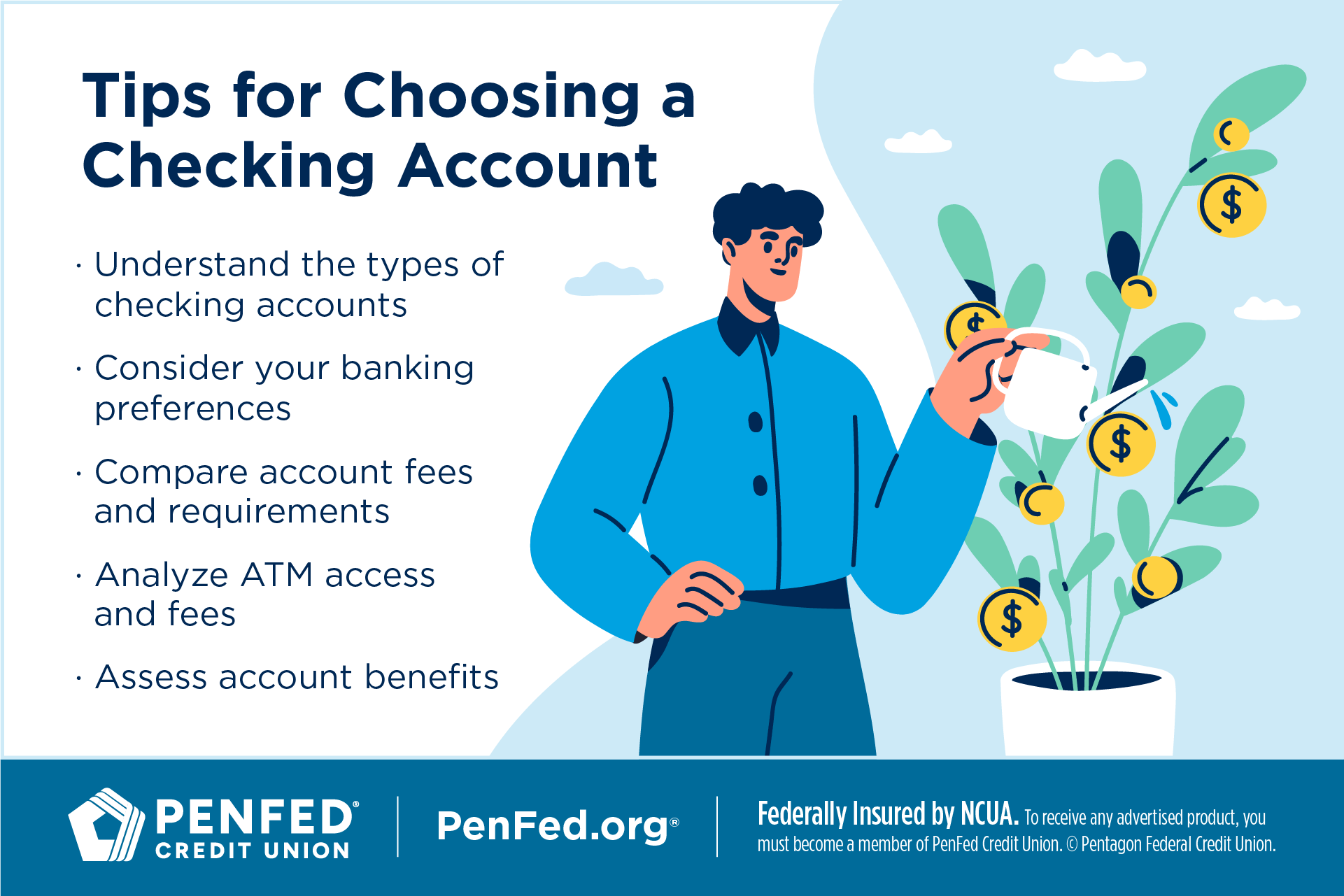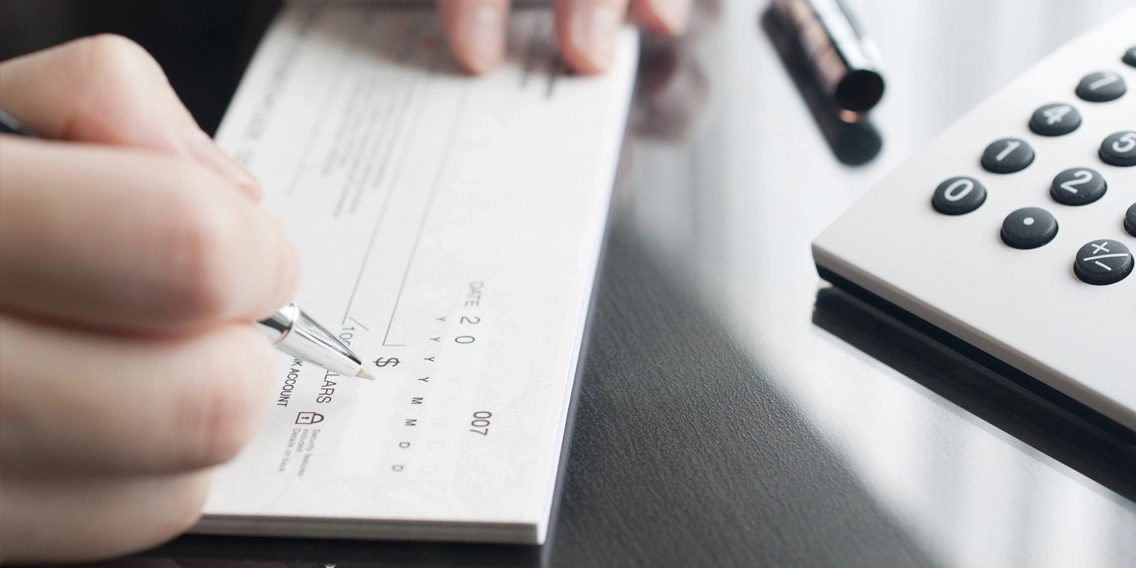CHECKING & SAVINGS
How to Choose a Checking Account
What you'll learn:How to choose a checking account
EXPECTED READ TIME:8 MINUTES
From buying groceries with your debit card to making deposits and setting up auto-pay, your checking account runs your day-to-day. But the world of checking accounts is pretty diverse, so we're here to help you make sense of the variety and find one that meets your daily needs.

Understand the Types of Checking Accounts
You might be surprised by how many different types of checking accounts there are and some of the features they offer. Some are tailored to specific groups of people or life stages, such as students or senior citizens, while others prioritize certain features like ATM usage.
Whatever the type, checking accounts allow you to access your money on a daily basis. You can do this by writing a check, initiating a transaction online, or using a debit/ATM card or digital wallet, and you can manage your funds via online or mobile banking resources.
Here are a few common checking account types to consider:
Standard Checking
Standard checking accounts typically pay little to no interest, but starting with this type can help you determine your core needs. Once you have a standard account up and running, you can continue to shop for an account that's more tailored to your preferences.
If this is your first checking account, look for account features that meet the needs of someone just starting out — or rebooting — their financial journey, such as:
- Minimal fees/possibility for waived fees
- Mobile banking app
- No or low minimum balance
Free Checking
A free checking account is just like a standard checking account except that it comes without monthly maintenance fees. Even if a regular account’s maintenance fees seem small, over a single year they can cost you hundreds of dollars.
Before opening a free checking account, ask about any possible fees you could be charged. Sometimes banks charge for certain features or services, such as:
- Overdrafts
- Stop payments
- ATM usage
- Debit card usage
- Returned deposits
- Wire fees
- Returned checks due to non-sufficient funds (NSF)
Before opening a free checking account, ask about any possible fees you could be charged.
Student Checking
Student checking accounts are designed for students between the ages of 17 and 24 years old. Like free checking accounts, they typically don’t charge monthly maintenance fees, and they may waive some other fees, too. There’s usually a very low (or no) minimum balance requirement.
You may be able to open a student checking account at your high school or college campus. Just be sure to ask what happens to your account once you graduate or age out. Some financial institutions will allow you to choose whether you want to convert your account and what kind of checking you want it to become.
Interest-bearing Checking
Interest-bearing checking accounts earn interest (or dividends if you’re at a credit union) on your account balance, similar to the way your savings account earns interest. The catch is that these accounts usually have a minimum balance requirement, meaning that you have to keep a certain amount of money in your checking account. If your balance falls below that threshold, you may have to pay maintenance fees, have to pay a penalty, or stop earning interest until your balance increases.
Interest-bearing checking accounts earn interest (or dividends if you’re at a credit union) on your account balance.
Joint Checking
A joint checking account is a checking account that’s shared between two or more people. Joint accounts are common for adults who share expenses, such as:
- Married or long-term couples
- Parents sharing the costs of raising children
- Adult children helping aging parents
- Roommates sharing living expenses
Keep in mind that while a joint account can be convenient, managing one takes a lot of trust and communication. Anyone whose name is on a joint account can spend, transfer, and withdraw money from that account. You can learn more about sharing finances in our article How to Manage a Joint Checking Account.
Rewards Checking
Rewards checking is similar to having a rewards credit card. Each time you spend from your checking account, you earn cash back, rewards points, or miles you can redeem. Some also offer interest on your account balance.
There are some drawbacks to rewards checking, especially if you’re just starting out. For one thing, they require much higher minimum balances and tend to have more and higher fees. Some programs cap the amount of rewards you can earn and will only pay interest up to a certain balance. Often, credit cards offer better rewards that are easier to navigate and more affordable.
Often, credit cards offer better rewards than rewards checking accounts.
Premium Checking
Some financial institutions offer checking accounts with higher-tiered perks like ATM fee waivers or rebates, free checks, free wire transfers, or a higher interest rate on your savings accounts at the same institution. These premier accounts require higher minimum balances, usually $10,000 or more.
Premier checking can be great if you use lots of different services from your bank or credit union and you use them often. However, you may struggle to maintain such a high balance if you’re just starting your career or learning to budget for the first time. Remember, you can always start with basic checking, build your money management skills, and work up to an account with more bells and whistles.
Consider Your Banking Preferences
You can open a checking account at a bank, credit union, or online bank. Which one is right for you depends on your needs and preferences.
Traditional banks and credit unions offer local branches and a network of ATMs you can use for withdrawals and deposits. They offer a range of products and services beyond checking and savings accounts, including credit cards, car loans, personal loans, and mortgages. While their interest rates may not be as high as those with online banks, they make it easy to find help when you need it.
The difference between banks and credit unions is that banks are for-profit institutions owned by shareholders, while credit unions are non-profit, cooperative institutions. When you join a bank, you’re a customer, but when you join a credit union you become a member owning a small share of your new financial institution. In general, credit unions tend to offer lower loan rates and higher dividends than banks.
Online banks only exist online, which saves them money on rent, facilities, and staff. Often, they pass those savings on to customers in the form of competitive interest rates. The downside, however, is that it may be harder for their customers to find help when they need it.
Banks are for-profit institutions owned by shareholders, while credit unions are non-profit, cooperative institutions.
Compare Account Fees and Requirements
Some checking accounts come with more fees. Basic accounts typically have fewer fees, while accounts with more perks have more fees. You may be able to opt out of some, like monthly maintenance fees, if you qualify.
Before opening a checking account, ask for a list of fees and clarify which fees are required and how to have them waived. Here’s a list of common checking account fees to look out for:
- Minimum balance requirements are required for some checking accounts and not for others. The amount varies by account and by institution. These are sometimes called “minimum deposit requirements.”
- Monthly maintenance fees cover the bank’s cost of managing your account. These can vary a lot depending on the type of account you choose. You may be able to waive these fees by maintaining a certain account balance, opening a savings account at the same institution, belonging to certain professions (such as military personnel, teachers, or firefighters), or being over or under specific ages.
- Transaction fees are charges for the withdrawals, transfers, and other transactions you make on your account. Sometimes these only apply to less common transactions like wire transfers or international transactions.
- Overdraft charges are fees for spending more than is in your account. You can avoid these by creating a budget, signing up for balance alerts, and opting out of overdraft protection.
Analyze ATM Access and Fees
It’s important to understand what you need from your checking account, so you find one that works with you, not against you.
Maybe you work in an industry that largely operates on a cash basis, such as waitressing or bartending — or maybe you’re a huge proponent of envelope budgeting. Either way, ATM access and fees will be an important factor when choosing your checking account. Of course, if you largely rely on your debit card or digital wallet, this won’t be a huge factor.
Fees are another important consideration. If you regularly travel internationally, foreign transaction fees could cost you a small fortune — but they won’t matter much to someone who’s more of a homebody.
The overall number of fees, cost of each fee, and ability to waive them differs greatly, so do your homework and find the account that’s most affordable for how you live and bank.
Assess Account Benefits
Checking accounts come with a range of perks, from discounts on shopping and travel to identity theft protection. Not all perks will be useful for you, and the more perks stuffed into an account, the more expensive it tends to be. But defaulting to an account with no perks could mean missing out on great features that could help you save or manage your money more efficiently.
The more perks stuffed into an account, the more expensive it tends to be.
FAQs
A checking account is a place you can store your money until you need it. You can easily access funds in a checking account with a debit card, digital wallet, checkbook, ATM, or local bank or credit union branch. Visit our article What is a Checking Account and How Does it Work? to learn more.
A checking account is designed for lots of transactions. Your paycheck and other income gets deposited there and then you can pay your bills and make purchases from that account.
A savings account is designed to store your money safely. You may be able to withdraw money from savings, but you’ll be limited to a few transactions per month. Learn more.
Checking accounts are best for managing everyday spending and bill pay. They generally don’t earn interest so they’re not the best option for long-term saving.
There’s no legal limit to the number of checking accounts you can have, but having too many can overcomplicate your finances. The right number of checking accounts depends on how you organize your finances. Figure out your right number in our article How Many Checking Accounts Should You Have?
Your money is equally safe in checking and savings. Both account types are insured up to $250,000 per person, per institution. At banks, accounts are insured by the FDIC, while the NCUA insures accounts at credit unions. Your financial institutions also have ways they protect your accounts.
While any bank or credit union can provide you with a checking account, some offer more convenience, better features, and fewer fees. It’s important to look at accounts at multiple financial institutions so you can choose the one that best fits your needs.
Some financial institutions do offer checking accounts for children. These accounts come with parental controls and may have other protections like limited transactions and few (or no) fees. Kids can learn valuable money management skills by having their own checking account.
The Takeaway
Choosing a checking account can be overwhelming when there are so many options available. When in doubt, classic free checking is always a reliable way to start. Since there’s no limit on the number of checking accounts you can have, you can always open an additional account with more perks once you have a better sense of what you need.
Learn About PenFed Checking
See the features and benefits PenFed checking accounts have to offer.




